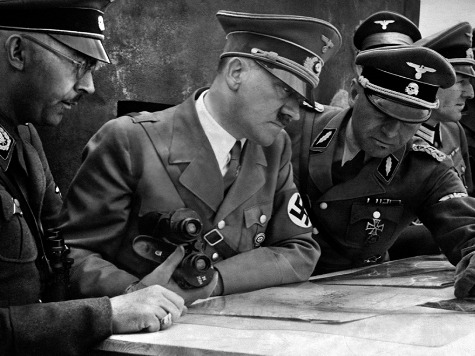
On July 20, 1944 Colonel Claus von Stauffenberg, a high-ranking German officer who had secretly turned against the Third Reich’s increasingly nihilistic war, conducted a botched attempt to assassinate Adolph Hitler in the Fuhrer’s notorious East Prussian “Wolf’s lair” headquarters. This was supposed to be the first big step in overthrowing the Nazi regime in what became the failed “Operation Valkyrie.”
Stauffenberg had an aide come into the room to tell him he had a call, and then the colonel departed leaving his bomb-filled briefcase behind. When the bomb went off it shattered tables, sent debris and splinters all over the room, and killed four men, but Hitler survived with only minor wounds.
Although this internal, German attempt to stop the Third Reich 70 years ago is the most famous, there were countless other acts of defiance that deserve to have their story told.
Stauffenberg’s plot sets off the narrative of historian Randall Hansen’s new Oxford University Press book, Disobeying Hitler: German Resistance After Valkyrie, that chronicles the notable to the mostly forgotten German acts of resistance against the Nazis. Stauffenberg’s plan failed and he was quickly caught and executed by the Gestapo secret police, but many of his co-conspirators continued to resist. And there were numerous other incidents of German soldiers and civilians defying Hitler and the Nazi authorities to save lives, cities, and what many believed to be the soul of the German nation.
Hansen describes the fate of Valkyrie’s other conspirators, such as Henning von Tresckow who said to his cousin shortly before committing suicide on the Eastern Front:
Now everyone will turn upon us and cover us with abuse. But my convictions remain unshaken–we have done the right thing. Hitler is not only the archenemy of Germany; he is the archenemy of the whole world. In a few hours’ time I shall stand before God, answering for my actions and my omissions. I think I shall be able to uphold with a clear conscience all that I have done in my fight against Hitler.
Resistors had different reasons for opposing Hitler, from practical to noble, and Disobeying Hitler is an impressive overview of these many acts of defiance outside of the July 20 plot in the Wolf’s Lair.
For instance, Stauffenberg’s coup continued in Paris on that same day. His cousin and co-conspirator, Luftwaffe Oberstlleutnant Caesar von Hofacker and his commander General Carl-Heinrich Stulpnagel, conducted an operation to capture the SS and SD in the city. Shockingly, with the help of a German army security regiment, they were able to round up and arrest over 1,200 SS and SD in Paris without a single shot being fired.
The overthrow of the SS in Paris was a stunning victory that turned out to be short-lived as news broke that Hitler had survived Stauffenberg’s assassination attempt and the Nazi regime quickly regained order.
Hofacker was eventually arrested and put on trial, which the Nazis thought would be good political theater. Hansen wrote that the “trials were presided over by Roland Freisler, a former Communist who, like few others of his ilk, became a Nazi fanatic.” However, Hofacker turned the trial into an indictment of the regime by taking aim at the justification of the authoritarian state that trampled on individual rights and stripped people of their humanity.
“The vital point running through all [your] questions is the totalitarian claim of the state over the citizen to the exclusion of his religious and moral obligations towards God,” Hofacker said to an apoplectic Freisler.
Another conspirator on trial, Hans-Bernd von Haeften, was equally forceful in repudiating Nazism. He said, “According to the view I have of the role of the Fuhrer in world history, I assume he is a powerful instrument of evil.”
Of the fascinating accounts that Disobeying Hitler highlights is the preservation of Paris when the German army withdrew from France. Although many historians have given credit to German Maj. Gen. Dietrich von Choltitz for disobeying Hitler’s orders to level the city, it was the individual of German soldiers fighting the French resistance, and German military weakness, that ultimately prevented the destruction according to Hansen.
The city was inundated with small arms fire in the final stages of German occupation, but Cholitz and the German soldiers did not bring out the big guns. Hansen wrote that “Paris was sprayed with bullets. Bullets–but not shells.”
Besides the larger acts of resistance, Hansen details the smaller acts of disobediance German officers and soldiers undertook on the Eastern and Western fronts, as well as the organized resistance of German citizens. He claims that these actions were important in the eventual rebuilding of Germany. Hansen concluded: “The post-July 20 disobeyers helped ensure that there was a Germany that could be economically, physically, and morally rebuilt. Collectively, they played a great and largely unrecognized role in the recovery of Germany and, therefore, Europe.”
Disobeying Hitler provides a fantastic and detailed overview of the largely forgotten story of German resistance to the Nazi state and is a great read for the 70th anniversary of Stauffenberg’s daring plot to bring down the authoritarian regime.

COMMENTS
Please let us know if you're having issues with commenting.